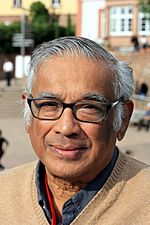S. R. Srinivasa Varadhan facts for kids
Quick facts for kids
Srinivasa Varadhan
|
|
|---|---|

Srinivasa Varadhan at the 1st Heidelberg Laureate Forum in September 2013
|
|
| Born | 2 January 1940 |
| Education | Presidency College, Chennai (BS, MS) Indian Statistical Institute (PhD) |
| Known for | Martingale problems; Large deviation theory |
| Awards | Padma Vibhushan (2023) National Medal of Science (2010) Padma Bhushan (2008) Abel Prize (2007) Steele Prize (1996) Birkhoff Prize (1994) |
| Scientific career | |
| Fields | Mathematics |
| Institutions | Courant Institute of Mathematical Sciences (New York University) |
| Doctoral advisor | C R Rao |
| Doctoral students | Peter Friz Jeremy Quastel Fraydoun Rezakhanlou |
Sathamangalam Ranga Iyengar Srinivasa Varadhan, also known as Raghu, is a famous Indian American mathematician and statistician. He was born on January 2, 1940. He is well-known for his important work in probability theory. This field of math deals with how likely events are to happen.
Varadhan is especially famous for creating a special theory called "large deviations." This theory helps us understand rare events that are very unlikely but can still happen. He also made big contributions to understanding "diffusion processes," which describe how things spread out over time, like how a drop of ink spreads in water. In 2007, he made history by becoming the first person from Asia to win the Abel Prize, which is like the Nobel Prize for mathematics.
Early Life and Education
Srinivasa Varadhan was born in 1940 in Chennai, India, which was then called Madras. His family moved to Kolkata in 1953. He spent his childhood years growing up in both Chennai and Kolkata.
He went to Presidency College, Chennai for his university studies. He earned his first degree in 1959 and his master's degree in 1960. Later, he continued his studies at the Indian Statistical Institute. In 1963, he earned his PhD, which is the highest university degree. His advisor was a famous mathematician named C R Rao.
Varadhan was part of a special group of four talented students at the Indian Statistical Institute between 1956 and 1963. These four students were very well-known for their mathematical skills.
Career Highlights
Since 1963, Varadhan has worked at the Courant Institute of Mathematical Sciences at New York University. He started there as a postdoctoral fellow, which is a researcher who has just finished their PhD. He was strongly recommended for this position by another mathematician, Monroe D. Donsker.
At the Courant Institute, he met Daniel Stroock, who became a close friend and worked with him on many projects. Stroock once wrote about Varadhan's early days there. He mentioned that even though their offices were simple, a lot of important mathematics came from that building.
Today, Varadhan is still a professor at the Courant Institute. He is known for his teamwork with Daniel W. Stroock on diffusion processes. He also did important work on large deviations with Monroe D. Donsker. He has also helped judge the Infosys Prize for Mathematical Sciences.
Awards and Honours
Srinivasa Varadhan has received many important awards and honours for his work. In 2010, he received the National Medal of Science from President Barack Obama. This is the highest honour the United States government gives to scientists.
He also received the Birkhoff Prize in 1994. In 1996, he was given the Leroy P. Steele Prize for Seminal Contribution to Research by the American Mathematical Society. This award recognized his important work with Daniel W. Stroock on diffusion processes.
In 2007, he was awarded the Abel Prize for his groundbreaking work on large deviations with Monroe D. Donsker. This is one of the most prestigious awards in mathematics. The Government of India also honoured him with the Padma Bhushan in 2008. In 2023, he received India's second-highest civilian honour, the Padma Vibhushan.
Varadhan has also received honorary degrees from two universities: Université Pierre et Marie Curie in Paris (2003) and the Indian Statistical Institute in Kolkata (2004).
He is a member of many important scientific groups, including the United States National Academy of Sciences and the Royal Society. Being a member of these groups shows how highly respected he is in the world of science and mathematics.
See also
 In Spanish: Srinivasa Varadhan para niños
In Spanish: Srinivasa Varadhan para niños
- Varadhan's lemma
 | Precious Adams |
 | Lauren Anderson |
 | Janet Collins |

